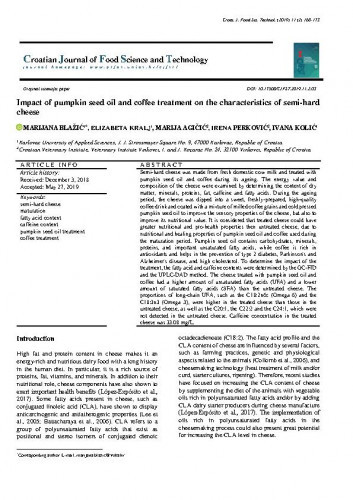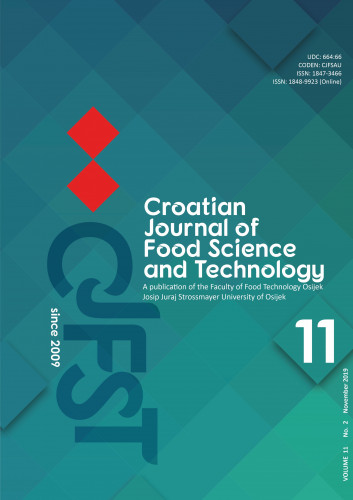Semi-hard cheese was made from fresh domestic cow milk and treated with pumpkin seed oil and coffee during its ageing. The energy value and composition of the cheese were examined by determining the content of dry matter, minerals, proteins, fat, caffeine and fatty acids. During the ageing period, the cheese was dipped into a sweet, freshly-prepared, high-quality coffee drink and coated with a mixture of milled coffee grains and cold pressed pumpkin seed oil to improve the sensory properties of the cheese, but also to improve its nutritional value. It is considered that treated cheese could have greater nutritional and pro-health properties then untreated cheese, due to nutritional and healing properties of pumpkin seed oil and coffee used during the maturation period. Pumpkin seed oil contains carbohydrates, minerals, proteins, and important unsaturated fatty acids, while coffee is rich in antioxidants and helps in the prevention of type 2 diabetes, Parkinson's and Alzheimer's disease, and high cholesterol. To determine the impact of the treatment, the fatty acid and caffeine contents were determined by the GC-FID and the UPLC-DAD method. The cheese treated with pumpkin seed oil and coffee had a higher amount of unsaturated fatty acids (UFA) and a lower amount of saturated fatty acids (SFA) than the untreated cheese. The proportions of long-chain UFA, such as the C18:2n6c (Omega 6) and the C18:3n3 (Omega 3), were higher in the treated cheese than those in the untreated cheese, as well as the C20:1, the C22:2 and the C24:1, which were not detected in the untreated cheese. Caffeine concentration in the treated cheese was 33.08 mg/L.
Sažetak

 Croatian journal of food science and technology : a publication of the Faculty of Food Technology Osijek : 11,2(2019) / editor-in-chief Jurislav Babić.
Croatian journal of food science and technology : a publication of the Faculty of Food Technology Osijek : 11,2(2019) / editor-in-chief Jurislav Babić.